SWEDISH SOUTH ASIAN STUDIES NETWORK
Report from the 17th European Conference
on Modern South Asian Studies,
at Heidelberg, Germany, 9–14 September, 2002:
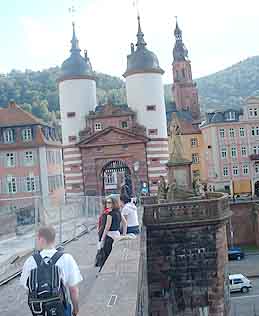 Heidelberg
– located along the river Neckar in southern Germany; surrounded
by green mountains, and with a great castle ruin watching over the town.
The charming mediaeval city of Heidelberg offered an inspiring place for
the 300 or so participants to the 17th EASAS (European Conference on Modern
South Asian Studies) conference in the middle of September, 2002.
Heidelberg
– located along the river Neckar in southern Germany; surrounded
by green mountains, and with a great castle ruin watching over the town.
The charming mediaeval city of Heidelberg offered an inspiring place for
the 300 or so participants to the 17th EASAS (European Conference on Modern
South Asian Studies) conference in the middle of September, 2002.
An inaugural lecture by Susanne Hoeber Rudolph (University of Chicago) about ‘The Coffee House and the Ashram. Gandhi, Habermas and Civil Society’ in the old convocation Hall of the University of Hedelberg also helped to create a sense of community, which was developed further over a cup of coffee or a Pilsener in one of the many ‘coffee houses’ of Heidelberg. We were – in the nice and sunny September weather – taken for a nice boat ride along the Neckar and its sluices, and we had a cordial conference dinner at the Palais Prinz Karl at the Alte Kornmarkt.
Südasien-Institut celebrates 40 years
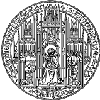 The
conference took place in the spacious old style lecture halls of the Neue
Universität at the Universitätsplatz in the old city. It was
hosted by the Heidelberg University’s South
Asia Institute (Südasien-Institut), which this year celebrates
its 40th anniversary. During the four eventful decades of its existence,
the Institute has gone a long way to fulfil its mandate for research and
teaching on South Asia.
The
conference took place in the spacious old style lecture halls of the Neue
Universität at the Universitätsplatz in the old city. It was
hosted by the Heidelberg University’s South
Asia Institute (Südasien-Institut), which this year celebrates
its 40th anniversary. During the four eventful decades of its existence,
the Institute has gone a long way to fulfil its mandate for research and
teaching on South Asia.
With its eight full departments of Anthropology, Classical Indology, Development
Economics, International Economics, History, Geography, Modern Indology
and Political Science, the institute has already become a major centre
for interdisciplinary teaching, research and networking.
This broad range of interests is sustained by an immense library holding with over 240 000 volumes, fully equipped with all modern facilities in including a new reading room and access to other national and international holdings of complementary interests. Visit the library through its web page (information only in German).
Panels on a broad variety of topics
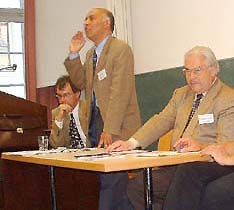 Subrata
Mitra, director of SAI, Dieter Rothermund,
and other professors of the programme committee as well as Tilman
Frasch and the staff of SAI, had done a good job in putting together
the 36 panels that were held. See
the full list of panels on the conference’ web page.
Subrata
Mitra, director of SAI, Dieter Rothermund,
and other professors of the programme committee as well as Tilman
Frasch and the staff of SAI, had done a good job in putting together
the 36 panels that were held. See
the full list of panels on the conference’ web page.
Most of the panels were truly interdisciplinary with a fair
participation also of South Asian scholars. However, there were few scholars
coming from Pakistan, and the recent dramatic events in Afghanistan were
not covered by any panel.
What was ‘in’ were topics such as political and military conflicts
covering everything from the Indo-Pak conflict to the peace process in
Sri Lanka. While the former conflict didn’t seem to offer any easy
way out, the latter process was described as very promising.
There was also great interest in cultural nationalism and the political development in India, the federalist system and the proliferation of political parties in state and national parliaments (the current Indian National Democratic Alliance government consists of 22 national and regional parties!). Thus, with is majority constituency system, the expectation that a two party system would eventually emerge has not come true.
As usual religions of South Asia are engaging quite a few
scholars. One panel dealt with Religious reform
movements' with 11 papers, among them Yoginder
Sikand’s extremely interesting paper on the Deendar Anjuman
movement in South India – ”Between Dialogue and Conflict,
Deendar Anjuman 1920–2000”. Another popular panel was ‘Gender
and Religions in South Asia’ with no less than 14 papers (look
out for an anthology from this panel). The same goes for history with
two very strong panels: ‘Continuity and Change
in South Asia´and ‘Little Kingdoms
as a Model of the pre-Modern South Asian State' and a lot of history
papers also in other panels.
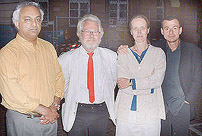 |
| K Sivaramakrishnan (University of Washington), Staffan Lindberg, Gunnel Cederlöf and Beppe Karlsson |
‘The International Indian Diaspora’
is another topic of considerable interest with many papers. These show
that there is an increasing awareness of Indian roots across the globe
and increasing communication with ‘Mother India’ among new emigrants
(via travelling, e-mails, and financial investments). For example, Mohan
K Gautam asked the general assembly if the people of Indian origin
in the Caribbean countries could be considered to belong to India!
In panel no 41, on 'South Asian Society: Brittish
Colonialism and the Emergence of Subaltern Networks in the Indian
Ocean Region' Harald Fischer-Tiné
from Berlin drew a large crowd for his paper on a somewhat less known
phenomenon from the colonial history, on ”The European Networks
of Prostitution and Colonial Anxiety in South Asia”, dealing
with the period just before the First World War, with trafficking of girls
mostly from the Habsburg Empire to the Indian port cities and onwards
to East Asia.
Regional issues were covered in panels on Bangladesh, Sri
Lanka, Karnataka (with 22 papers the biggest panel!), Tamil Nadu, Mahaharashtra,
Rajasthan, Orissa, Bengal, and Punjab. Depending on the convenors, the
panels covered a variety of issues, such as cultural, anthropological,
linguistic, economic and political. Most spectacular was perhaps Peter
Schalk’s attack on the representation of the Veddah people
as an original tribe in the central highlands of Sri Lanka. In the same
panel Alan Bullion presented a paper on the Norwegian Peace making Process
in Sri Lanka, and John Neelsen a paper on the Sinhala–Tamil conflict
in the same country, ”Political Conflict and Political Accomodation
in a Multiethnic State”.
The panel on Punjab offered two very interesting papers, one by Shinder
Thandi on ”Diaspora financing of rural development in Punjab”,
and one by Jivtesh Singh Mandi on ”The
Paradox of Punjab: A Rich State with Chronic Fiscal Deficits’.
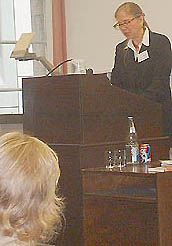 |
| Susanna von der Heide on the killings of the Nepalese royal family in 2001. |
Several panels dealt with the Himalayas, such as ‘Representing Local Histories’ (with 14 papers) and ‘Anthropology and Himalayan Politics’, in which Susanna von der Heide presented an interesting paper on ”The Death of the King of Nepal and his Family – Fateful intra- and intercultural as well as National and Internetaional Entanglements”. Anthropology was also prominent in a panel of ‘Tribal life’, with the very concept of ‘tribal’ itself highly contested.
Economic development nowadays attracts much less attention than it used to. Perhaps it is symptomatic that the panel on ‘Problems of Urbanization in South Asia, Past and Present’ had 12 papers, the panel on ‘Education’ had 14 papers, and the panel ‘Nature, Nation and Empire’ had 7 papers, while the panels on ‘Rural Development’ and ‘Industrialisation’ only had a handful each. However, in the latter panel, Dieter Rothermund presented a very interesting overview of the ”Industrial Production and Technological progress in India”, which should deserve a wide readership.
The Nordic participation was particularly strong in the panels on ‘Gender and Religions’ (organised by Eva Hellman and Sidsel Hansson), where Åsa Elisabeth Hole presented a paper on the religious traditions among Gujarati Hindu women in diaspora, and Eva Rosén-Hockersmith presented a paper on North Indian Astrology, based on fieldwork in Kolkata; and equally strong in the panel on 'Nature, Nation and Empire’ (organised by Gunnel Cederlöf and K Sivaramakrishnan).
Staffan Lindberg and Lars Eklund
PS. Please look at some more photos from the 2002 conference at Heidelberg
The next, 18th, European conference on Modern South Asia Studies will be arranged by SASNET and Lund University 6–9 July, 2004.
An invitation for the conference is found at http://www.sasnet.lu.se/EASAS18.html.
We hope to be able to organise just as interesting panels as in Heidelberg.
SASNET - Swedish South Asian Studies Network/Lund University
Address: Scheelevägen 15 D, SE-223 70 Lund, Sweden
Phone: +46 46 222 73 40
Webmaster: Lars Eklund
Last updated 2006-01-27
